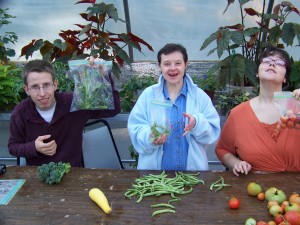A Chapter of The Arc Promoting Health and Nutrition in Schenectady County, New York
 A few years ago, Schenectady County Public Health Services and Schenectady Arc formed a unique partnership to address the high rates of chronic disease and obesity among people with I/DD in Schenectady County through the Strategic Alliance for Health. Schenectady Arc a provider of residential, vocational, clinical, and adult day services in New York State’s Capital Region, recognized that among its 1,480 participants, nearly 10 percent were diagnosed with cardiovascular disease, obesity, or diabetes and wanted to do something to address the needs of those they served.
A few years ago, Schenectady County Public Health Services and Schenectady Arc formed a unique partnership to address the high rates of chronic disease and obesity among people with I/DD in Schenectady County through the Strategic Alliance for Health. Schenectady Arc a provider of residential, vocational, clinical, and adult day services in New York State’s Capital Region, recognized that among its 1,480 participants, nearly 10 percent were diagnosed with cardiovascular disease, obesity, or diabetes and wanted to do something to address the needs of those they served.
While nationally-based research showed individuals with I/DD were more prone to incidence of chronic disease, Schenectady Arc had confidence that they could help their participants by improving their diet and educating them about healthy eating habits. Further research found that children who participated in a “seed to table” nutrition education program tended to increase their consumption of fruits and vegetables. Through this program, children participated in a variety of regularly scheduled activities such as vegetable taste-testing, hands-on gardening, and recipe preparation. Based on these studies, Schenectady Arc created Know, Grow and Eat Your Vegetables, a garden-based nutrition education program for people with I/DD. The agency’s horticulture coordinator oversaw the new program which was located at Schenectady Arc’s commercial-sized greenhouse in Rotterdam, NY. The coordinator assessed awareness of and preference for 15 vegetable types and, worked alongside 70 participants to plant and cultivate seedlings.
 While the vegetables were being grown, nutrition educators from Cornell Cooperative Extension of Schenectady County (CCESC) conducted a six-week program adapted to the specific needs of individuals with I/DD. This training provided participants and staff with strategies regarding healthy meal preparation practices and how to incorporate vegetables into daily meals and snacks.
While the vegetables were being grown, nutrition educators from Cornell Cooperative Extension of Schenectady County (CCESC) conducted a six-week program adapted to the specific needs of individuals with I/DD. This training provided participants and staff with strategies regarding healthy meal preparation practices and how to incorporate vegetables into daily meals and snacks.
This remarkable program continues to flourish and provide nutrition and education for individuals with I/DD in Schenectady County. Since the program began, participants have harvested approximately 1,000 vegetables. Vegetable packets, along with recipes, were distributed for consumption in group home or family home settings. Last year, this program was named by The National Association of County and City Health Officials (NACCHO) as a model practice and an implementation guide can be found on the U.S. Centers for Disease Control and Prevention website! Also, during The Arc’s National Convention, Schenectady Arc and NACCHO presented together, giving chapters of The Arc the opportunity to learn from the success of this program.








